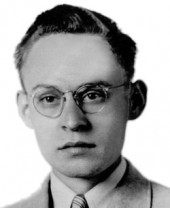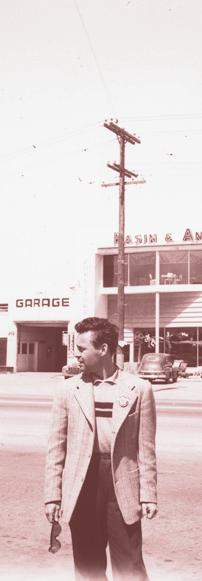William Dale Jennings
Biographic Profile
Press Release from Warner Brothers Studios
in promotion of the 1972 blockbuster hit, The Cowboys
 William Dale Jennings was born in Amarillo, Texas and moved with his family some months later to Denver where he spent his childhood in one of the most breathtakingly beautiful areas in the United States.
William Dale Jennings was born in Amarillo, Texas and moved with his family some months later to Denver where he spent his childhood in one of the most breathtakingly beautiful areas in the United States.
He insists that he was not a good student in those years but knowing him is to disagree. A man of such varied interests with a huge storehouse of a mind just made for foraging through and learning from, must have been listening when he says he wasn’t. His favorite subjects in school were literature and drama, and that you can believe. Dale Jennings creates the magic of a story with all the drama and impact that started the expression “I couldn’t put the book down till I finished it.”
 To read “The Cowboys” is to be swept up on those plains with a dozen teenage boys on their first cattle drive and know every bit of wind and rain and hurt and pain, to feel every pride and experience every new experience with them. To look up, even for an instant, from your reading is to thud back to reality and be very disappointed not to be in a sleeping bag under the moon. It is not possible to one minute be in the very eye of a stampeding herd and in the next instant back in a comfortable living room… but he makes it so.
To read “The Cowboys” is to be swept up on those plains with a dozen teenage boys on their first cattle drive and know every bit of wind and rain and hurt and pain, to feel every pride and experience every new experience with them. To look up, even for an instant, from your reading is to thud back to reality and be very disappointed not to be in a sleeping bag under the moon. It is not possible to one minute be in the very eye of a stampeding herd and in the next instant back in a comfortable living room… but he makes it so.
Dale Jennings has experienced a lot of things and what better road to becoming an author of import and impact. He knew from childhood that he was hooked on film, but it took him a while to get close to it. He left home at 18 and went to Los Angeles where he held a wondrous variety of jobs from photographer’s devil to shoe salesman, from stock clerk to usher, and then, along with some equally industrious young friends, he founded Theatre Caravan. It was a small band of performers, dancers and artists for whom he wrote and directed his own plays, playlets and sketches and went around to clubs performing them against wrapping paper drops hung on poles. Dale wrote., directed and played in some 80 of these one-two-three and up to five-actors before he left.
 When all his friends were being drafted into WWII, Dale went off to see New York and waited to be drafted, too. He saw every play on Broadway before being called up. He spent his Army time in Texas, Guadalcanal and Leyte as an intelligence Sergeant and base newspaper editor and being in a radar searchlight outfit. During that time he sold his first short story, to Esquire, called “Children of the Cemetery.” Discharged in 1946, he sold another short story, a science fiction one called “The Gingerbread Man,” and moved back to Los Angeles to start classes at USC majoring in Cinema. He finished 2 years at USC and worked in his spare time as the only non-Spanish speaking waiter on Olvera Street.
When all his friends were being drafted into WWII, Dale went off to see New York and waited to be drafted, too. He saw every play on Broadway before being called up. He spent his Army time in Texas, Guadalcanal and Leyte as an intelligence Sergeant and base newspaper editor and being in a radar searchlight outfit. During that time he sold his first short story, to Esquire, called “Children of the Cemetery.” Discharged in 1946, he sold another short story, a science fiction one called “The Gingerbread Man,” and moved back to Los Angeles to start classes at USC majoring in Cinema. He finished 2 years at USC and worked in his spare time as the only non-Spanish speaking waiter on Olvera Street.
Dale took a job with Geller Productions, an operation which put on shows for clubs like the Kiwanis and Elks or local charities all over the country for fund-raising. Dale directed the shows, sometimes wrote them, cast them from local talent and played mother to first time actors from L.A. to Maine and back. During these years even his childhood training as a dancer came in handy as when he was asked to direct and stage the annual Sun Festival in El Paso, Texas for a TV special. He did everything from planning the coronation of the queen to choreographing a ballet to Tschaikowsky’s “Waltz of the Flowers,” using local ballerinas ranging in age from 3 to 53.
 By this time the traveling bug, which had been biting Dale all along, flew on to someone else for a while and Dale settled in Los Angeles again as Art Director for TV Guide. TV Guide also made him regional editor of their San Francisco domain, but Dale left them to become an advance man for the famous Ice Capades. Back on the road again, like a gypsy, Dale hopped from town to town always one jump ahead of his glittering show, setting things up for the skaters. It was during these years that Dale wrote his first and now classic book, “The Ronin,” in a series of hotel rooms across the country “while,” as he says, “dodging telegrams from my boss in all major cities.”
By this time the traveling bug, which had been biting Dale all along, flew on to someone else for a while and Dale settled in Los Angeles again as Art Director for TV Guide. TV Guide also made him regional editor of their San Francisco domain, but Dale left them to become an advance man for the famous Ice Capades. Back on the road again, like a gypsy, Dale hopped from town to town always one jump ahead of his glittering show, setting things up for the skaters. It was during these years that Dale wrote his first and now classic book, “The Ronin,” in a series of hotel rooms across the country “while,” as he says, “dodging telegrams from my boss in all major cities.”
“The Ronin” is as different from “The Cowboys” as books could possibly be… except in one thing. The author holds the reader captive. Finding the story of a 12th century Samurai exciting and valid today may seem incredible, but Dale Jennings brings it screaming to life right in your hands.
In 1960 Dale went to work for Hollywood Animators, working in the production of animated films. There he re-met Max Hutto, a former radio director whom Dale had known while with Ice Capades. Dale showed Max a script for a little film held written called “Barbara.” Max read it overnight and said “Let’s shoot it,” and they did. They used an animation camera at night and shot it with cartoon drawings that Dale did himself. It took several weeks and $2,000 and it won lst Prize in the Palo Alto Film Festival. That was the beginning of a long friendship and profitable partnership for Dale and Max and Ralph Hulett, the famous California watercolorist. They left Hollywood Animators to start Interlude Films, which Dale describes as a company that made little films to be used in the interlude between features and coming attractions. Interlude also made TV commercials, documentaries, educational films and industrial films.
When Dale finished a screenplay called “Birdie,” he and Max agreed to cut down on production so Dale could concentrate on writing. He started on “The Cowboys” which was quickly bought by producer-director Mark Rydell and made into a film by him at Warner Bros. starring John Wayne. Dale has another book, “90 Miles From Home,” about to be published, and he’s currently working on a novel called “The Doomsday Revel.”
The author lives in Hollywood with his brother, a film distributor, in a rambling house with lovely outdoors where both Jennings men like to putter. Dale is also an avid film maker and spends a great deal of time working on his own film projects. When he isn’t filming or writing, he’s usually reading or researching. One of Dale’s greatest sources of relaxation, however, is cooking. A gourmet amateur chef, he turns out perfect recipes every-time, but insists “it’s more for the experience than the eating.”

